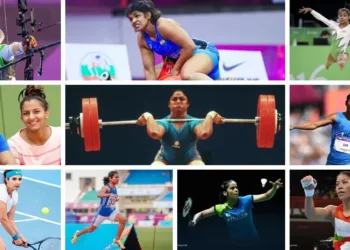Hombale Films ventures into uncharted territory with Mahavatar Narsimha, an ambitious animated retelling of Lord Vishnu’s fierce incarnation as the half-man, half-lion deity who defeated the tyrannical demon king Hiranyakashyap. This groundbreaking film marks the beginning of the Mahavatar Cinematic Universe, promising to revolutionize how Indian mythology is presented on the big screen through cutting-edge animation technology.
Table of Contents
Mahavatar Narsimha Review: A Visual and Emotional Journey
Storyline and Narrative Excellence
The demon Hiranyakashyap seeks revenge on Vishnu and declares himself a god. His son Prahlad remains devoted to Vishnu. Vishnu manifests as Narsimha to defeat the demon and restore balance. Director Ashwin Kumar transforms this ancient tale into a contemporary cinematic experience that resonates with modern audiences while maintaining its spiritual essence.

The narrative structure follows the classic good versus evil paradigm, but Kumar’s retelling of the legend of Narsimha is a highly entertaining and visually stunning animated spectacle. The film explores themes of unwavering devotion, parental conflict, and divine intervention with remarkable depth.
Animation Quality and Technical Brilliance
The animation quality is genuinely impressive. The film features stunning visuals and captivating storyline with breathtaking animation. The technical team has invested considerable effort in creating a visual feast that brings ancient mythology to life through modern technology.
Visually, the film is a feast. From vivid color palettes to detailed character designs, every frame demonstrates meticulous attention to detail. The 3D animation gives new life to familiar characters, making them feel contemporary yet respectful of their mythological origins.
However, some critics note that the animators did work hard to bring to life the visuals but they lack life, suggesting that while technically proficient, certain sequences could benefit from more emotional depth.

Character Development and Voice Performance
Prahlad: The Devoted Son
The character of Prahlad serves as the emotional anchor of the film. His unwavering devotion to Lord Vishnu despite his father’s tyrannical opposition creates the central conflict that drives the narrative forward. The animation brings out the innocence and determination of this young devotee beautifully.
Hiranyakashyap: The Antagonist
The demon king Hiranyakashyap is portrayed as a complex villain whose motivations stem from personal loss and wounded pride. The character design and animation effectively convey his transformation from a grieving father to a power-hungry tyrant.
Lord Narsimha: The Divine Avatar
When things get too bad, Vishnu appears as Narsimha – half man, half lion – to restore peace and destroy evil. The titular character’s emergence represents the film’s climactic moment, showcasing the animation team’s ability to create awe-inspiring divine imagery.
Production Values and Technical Aspects
Direction and Writing
The direction is precise yet poetic, drawing you into a world so immersive you forget you’re watching fiction. Ashwin Kumar’s vision brings together traditional storytelling with contemporary filmmaking techniques.

Music and Sound Design
The musical score by Sam CS attempts to complement the mythological grandeur, though music by Sam CS is not up to the mark and even few scenes feel like unnecessarily being dragged out. The sound design plays a crucial role in creating the epic atmosphere required for such a divine tale.
Editing and Pacing
Ajay Verma and Ashwin Kumar’s editing is sharp, maintaining the film’s momentum throughout its runtime. The pacing allows viewers to absorb the visual spectacle while following the narrative arc.
Mahavatar Narsimha Box Office and Reception
Critical Response
Mahavatar Narsimha is a rare and commendable entry in Indian cinema — a devotional animated feature that combines mythology with modern storytelling techniques. Critics have praised the film’s ambition and visual achievements while noting areas for improvement.
Despite its flaws, Hombale Films is earning praise for backing a project rooted in Indian culture and mythology. The production house’s commitment to exploring Indian stories through innovative mediums has been widely appreciated.
Audience Reception
Mahavatar Narsimha is an entertaining fare and will definitely do well in cinemas on the strength of Hindu patronage. The film has found particular resonance among audiences seeking quality family entertainment rooted in Indian values.

The Mahavatar Cinematic Universe
Rooted in spiritual lore and rendered with high-end visuals, this film attempts to redefine how Indian mythology is told on screen. It blends reverence with raw spectacle, aiming to set the stage for a franchise that could explore the divine avatars of Vishnu and beyond.
This ambitious project represents Hombale Films’ expansion into new territories after their success with the KGF franchise and Kantara. The Mahavatar Cinematic Universe promises to bring more of Lord Vishnu’s avatars to the big screen through similar animated treatments.
Technical Specifications and Release Details
| Aspect | Details |
|---|---|
| Director | Ashwin Kumar |
| Production House | Hombale Films (Presented by), Kleem Productions |
| Genre | Animation, Drama, Mythology |
| Release Date | July 25, 2025 |
| Format | 2D and 3D |
| Languages | Multiple Indian languages |
| Music Director | Sam CS |
| Editors | Ashwin Kumar, Ajay Verma |
Strengths and Weaknesses Analysis
| Strengths | Areas for Improvement |
|---|---|
| Stunning visual animation | Pacing issues in certain sequences |
| Strong mythological foundation | Music could be more impactful |
| Innovative approach to Indian cinema | Some animation sequences lack emotional depth |
| Family-friendly content | Character development could be deeper |
| Cultural significance | Narrative flow needs refinement |
Final Verdict
Mahavatar Narsimha represents a bold step forward for Indian cinema, particularly in the animation genre. While the film has its imperfections, Mahavatar Narsimha seems to have struck an emotional chord with some, especially in its conclusion.

The film succeeds in its primary objective of bringing ancient mythology to contemporary audiences through modern technology. It’s a story most Indians grew up hearing, but seeing it with stunning 3D animation makes it feel fresh and exciting.
For audiences seeking meaningful entertainment that combines spiritual themes with cutting-edge animation, Mahavatar Narsimha offers a unique cinematic experience. The film’s significance extends beyond entertainment, as it paves the way for more Indian mythological stories to be told through animation.
Rating: 3.5/5 Stars
Read More: Suniel Shetty’s Explosive Return: Hunter Season 2 Unleashes Epic Showdown with Jackie Shroff
FAQs
What is Mahavatar Narsimha about?
Mahavatar Narsimha tells the story of Lord Vishnu’s fierce incarnation as Narsimha (half-man, half-lion) who appears to protect his devotee Prahlad from his tyrannical father, the demon king Hiranyakashyap.
Is Mahavatar Narsimha suitable for children?
Yes, the film is designed as family-friendly entertainment that introduces children to Indian mythology through engaging animation while maintaining spiritual values and moral lessons.
What makes Mahavatar Narsimha different from other mythological films?
The film stands out for its high-quality 3D animation, being part of the planned Mahavatar Cinematic Universe, and its modern approach to presenting ancient Indian mythology to contemporary audiences.
Who produced Mahavatar Narsimha?
The film is produced by Kleem Productions and presented by Hombale Films, the production house behind successful franchises like KGF and Kantara.
Will there be more films in the Mahavatar series?
Yes, Mahavatar Narsimha is the first film in the planned Mahavatar Cinematic Universe, which aims to explore various avatars of Lord Vishnu through animated features.







